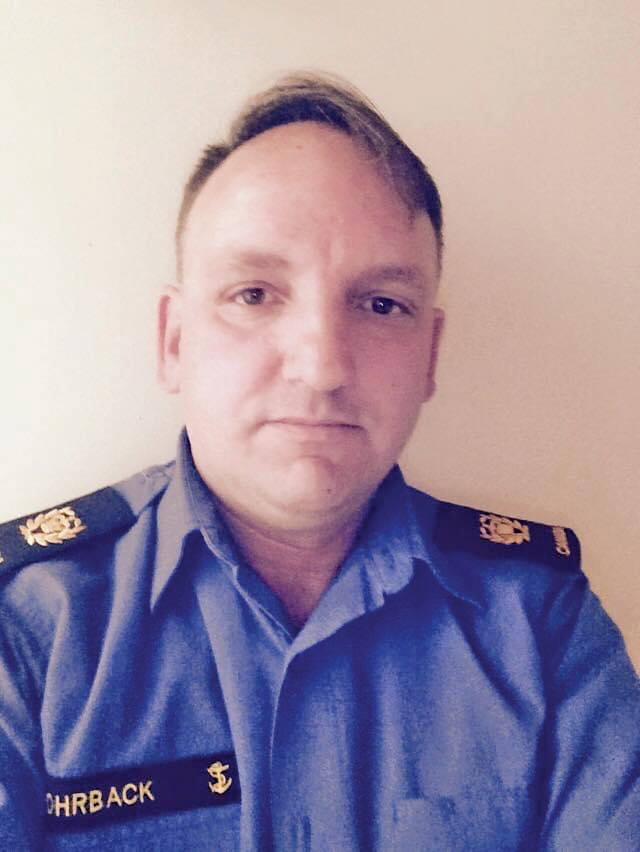Base Administration’s CPO2 Rohrback
By Lookout on Dec 10, 2020 with Comments 0
2Lt Jamie Boparai
Base Administration
––
Chief Petty Officer Second Class Herman Rohrback’s succession to becoming Base Administration’s Single Quarters Chief Steward started with a long career in the Sea Cadets.
It all began at the age of 12 when his twin brother’s Godfather became the Commanding Officer of the 129 Caribou, North Sydney Core in Cape Breton, NS.
He was continuously working towards growing his Cadet Corps and was challenged with a sudden loss of three cadets.
“The Commanding Officer asked us if we were interested in joining the program, so we did.”
CPO2 Rohrback fondly remembers his time with the Cadet Corps and would recommend joining to any young person looking for an adventure.
“It was exciting as a kid. I had the chance to advance personally, learn new life skills, and progress to new ranks and status’ by being promoted within the Cadet Corps organization.”
He made it all the way to the rank of Staff Sergeant.
The program gave him an opportunity to see other regions of Nova Scotia and Canada for the first time. He did an eight-week basic sailing course in Halifax and came to B.C. for a signal and communication course.
“I was very successful during my time with the Cadet Corps. In each of my last three years I was the recipient of the Most Outstanding Cadet Award.”
In his final year he was the first cadet to receive the newly minted Medal of Excellence awarded by the North Sydney Legion.
This success, after serving with the Cadet Corps for six years, aided in his decision that the military was an avenue he wanted to pursue.
He joined as a Boatswain, but was asked to select three additional trades, as Boatswain was no longer being offered to newly joining recruits.
“I selected infantry, artillery and firefighter; but, after waiting for a period of three months for my new trade, feelings of uncertainty about my future began to fester.”
Knowing the Steward trade was an option, he decided to take a leap of faith when asked if he was interested in that opportunity.
“I had no previous knowledge about the trade and about the new adventures that it would lead me to, I took a chance.”
Things always work out in the end.
“I have no regrets whatsoever in the trade that I had been given, especially since I was able to remain within the navy.”
Steward’s training meant he would become familiar with the hospitality field, mess management, non-public funds accounting, bookkeeping, and the ship’s warehouse.
He says the occupation can be tough as a Sailor First Class and below, but it becomes more rewarding when advancing through the ranks of Master Sailor and above.
“The work becomes more interesting with all the opportunities that arise through networking, which is inherent in the positions that we hold.”
An example, which also happens to be one of CPO2 Rohrback’s fondest memories, was when he was posted to 17 Wing Winnipeg in 2015. The Base Administration staff gathered together at a graveyard to help clean tombstones of fallen soldiers.
“It was a very sombre and humbling experience. Afterwards, we went to the local Legion and I had an opportunity to get to know the [Legion] President. He mentioned that Remembrance Day ceremonies were often quite small at the location and inquired about getting support from the Wing. I staffed a request to the Wing Chief and I was able to organize an event for that special day each year until I was posted to CFB Esquimalt.”
Now, as the Base Administration’s Single Quarters CPO/Military Occupation Structure Advisor, CPO2 Rohrback has a wide range of responsibilities.
“My duties include managing all the accommodation buildings here in CFB Esquimalt, Work Point, Signal Hill, and Albert Head. My responsibilities as the Steward MOC advisor are to assist the Career Manager in personnel movements, promotions, and trade-related issues.”
When pressed to point out some of his accomplishments thus far, especially with COVID-related taskings, he is quick to place the credit on his staff of 16 military personnel and eight commissionaires.
“They do it all. Unlike most units, when people started working from home, our staff just got busier. We had to make sure that all of our buildings were meeting the Province’s standards and regulations to ensure a safe and healthy environment for our residents. When most other trades go to minimum-manning we go to work; we are proud to do so, and of the support we provide.”
––––
Filed Under: Top Stories
About the Author:






